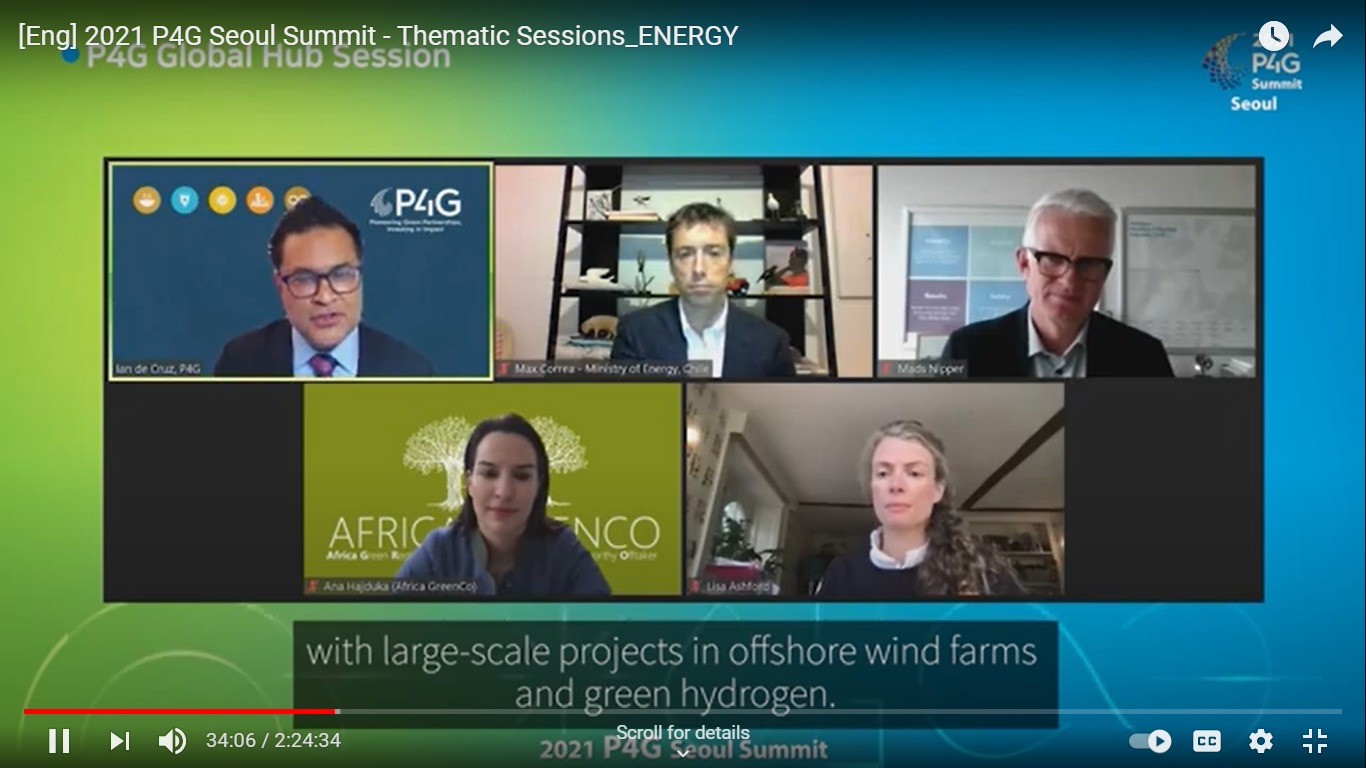P4G Partnerships Share Ambitious and Innovative Energy Transition Models at P4G Summit

Subject
P4G Summit
Country
Publication Date
2021-06-02
About
Low carbon renewable energy solutions with enormous growth potential exist and are being implemented in developing countries today. Through an enabling environment and investment, they can grow and replicate to deliver an energy transition that leaves no one behind.
On May 31,at the 2021 P4G Seoul Summit Thematic Session “A Greener Planet with Innovative Energy Solutions” speakers from the private sector, leaders of international organizations and P4G partnerships shared their visionary ideas backed by action - all in the pursuit of a more equitable and net zero future for all. Moderated by P4G Global Director Ian de Cruz, the session focused on existing solutions and tangible next steps to accelerate their growth.
Mads Nipper, CEO, Ørsted, opened the session with an inspirational keynote address on how the leading Danish energy company achieved its two targets of lowering offshore wind power prices and generating 85% of its energy from renewables by 2040 far ahead of time. This rapid transition was made possible by the enabling policies set by governments in Denmark, the Netherlands and the United Kingdom that gave Ørsted the safety net to make these long-term investments in low carbon solutions. Nipper urged the private sector to be catalysts for change and leverage platforms like P4G to accelerate the transformation required right now.
The next keynote speaker was Ana Hadjuka, CEO & Founder of Africa GreenCo, a P4G partnership that acts as a creditworthy buyer and seller of energy and reduces the risk of investing in renewable energy projects in Zambia. Hadjuka pointed out that while the electrification of Southern Africa offered great potential, it needed to be turned into a reality. She called the current piecemeal project-based funding approach to energy projects in Africa “a sticking plaster and not a cure.” She laid out GreenCo’s plans to mobilize billions of dollars by 2030 to create 4,000 jobs and power nearly six million homes. She concluded by reflecting on the shared vision between P4G and GreenCo, “we believe in the systems change that brings benefits to all actors in the energy space in Africa.”
Finally, Dan Jørgensen, Minister for Climate, Energy and Utilities, Denmark rounded out the keynote remarks by sharing Denmark’s long history of listening and cooperation. He announced the launch of a new report that tracks Denmark’s sustainable energy growth and called on participants to find ways to catalyze investments and accelerate innovation in an inclusive manner. He highlighted this as a defining hallmark of P4G.
De Cruz kicked off a panel discussion to focus on the specific solutions emerging in developing countries. He asked the panelists to share their investable solutions and how P4G could help scale that ambition.
Lisa Ashford, CEO, Ethex, spoke about Energise Africa’s role in bridging the financing gap to meet the Sustainable Development Goals by bringing in retail finance. The P4G partnership uses a crowdfunding platform to provide flexible and affordable capital to solar businesses across sub-Saharan Africa. This enables them to scale their businesses and in turn supply clean energy access for millions of people. The partnership aims to expand in other regions like Asia and sectors such as agro-tech, clean mobility and water. Ashford spoke about P4G’s role in helping Energise Africa access players that are not traditionally active in the crowdfunding space and allow them to open new markets to deliver impact. Ashford noted, “Solutions like Energise Africa potentially are limitless in their growth and highly replicable around the world.”
Saurabh Kumar, Executive Vice Chairperson of Energy Efficiency Services Limited (EESL) laid out their path to building a sustainable future for villages in India and ushering an energy transformation. This energy efficiency model starts with small solar installations in rural areas with accompanying battery storage units that can store energy for multiple purposes in the community. By bundling these into a power purchase agreement and offering it to a utility, the model becomes a sustainable one that could benefit millions in the country. He added that P4G not only gave models like his credibility but with its powerful global network could disseminate learnings that would allow developing countries to leapfrog into an energy transition.
Sharing the momentum created by Chile’s energy sector, Max Correa Achurra, Head of the Fuels and New Energies Division at the Ministry of Energy spoke about Chile’s ambitious commitment to reach carbon neutrality by 2050. He detailed the country’s vision of being one of the top three exporters of green hydrogen. Private sector investment plays a key role in achieving these goals and Correa shared how in a novel move, Chile allocated $50 million to support green hydrogen projects with around 40 projects already in the pipeline. He spoke about P4G’s network strength and ability to connect Chile with potential project developers to scale Chile’s energy transformation.
Nipper echoed the importance of green hydrogen for decarbonizing harder to abate sectors. In addition, he shared the need for policies to secure long-term investment so these innovations could become competitive products. He underscored the value of P4G in sharing best practices and forging partnerships between public and private entities to advances these innovations.
Dominic Waughray, Managing Director, World Economic Forum shared closing remarks and underscored the potential for P4G to link the examples heard at the session and transmit them from south to north.
“Partnership isn’t just one way traffic. There are two ways to this,” he said succinctly.
Waughray offered the influential political and private network of the World Economic Forum as a partner of P4G to scale these solutions. He closed the session with a sense of optimism from the innovative solutions taking shape across Africa, Latin America, Asia and Europe.
Watch the full session recording here.
